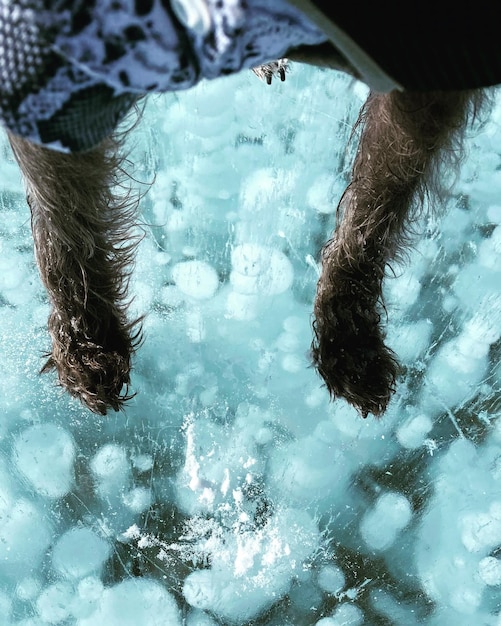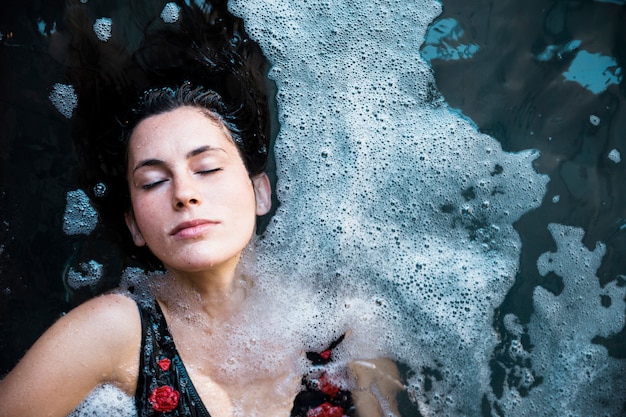The Surprising Benefits of Cold Water Therapy: Boost Immunity & Reduce Inflammation

Cold water therapy, involving short exposure to cold water, offers surprising benefits such as enhanced immunity, reduced inflammation, improved circulation, and mental resilience, making it a valuable addition to a health and wellness routine.
Immerse yourself in the invigorating world of cold water therapy and discover its remarkable impact on your well-being. This practice, which involves short-term exposure to cold water, has gained popularity for its potential to boost immunity and reduce inflammation. Let’s explore the surprising benefits of cold water therapy: boost immunity and reduce inflammation.
Understanding Cold Water Therapy
Cold water therapy, also known as cold hydrotherapy, involves using water at temperatures between 50-59°F (10-15°C) to treat health conditions or stimulate health benefits. This form of therapy has been practiced for centuries across various cultures, ranging from ancient Roman bathhouses to traditional Nordic saunas and ice swimming.
Historical Context
From ancient civilizations to modern wellness practices, cold water immersion has been used to promote physical and mental health. Historical texts reveal how physicians and athletes recognized its therapeutic properties, utilizing cold water treatments for various ailments and recovery.
Modern Applications
Today, cold water therapy is integrated into diverse health and wellness routines. Athletes use ice baths to reduce muscle soreness and speed up recovery, while wellness enthusiasts explore cold showers and swims to enhance their overall health and resilience.

Cold water therapy is not merely a trend but a well-researched practice with numerous health benefits.
Boosting the Immune System
One of the most compelling benefits of cold water therapy is its potential to enhance the immune system. Regular exposure to cold water can stimulate immune responses, making the body more resilient to infections and illnesses.
How Cold Exposure Stimulates Immunity
When the body is exposed to cold water, it activates various physiological mechanisms. These mechanisms include increased production of white blood cells, which are essential for fighting off infections. Studies have also shown that cold exposure can improve the activity of natural killer (NK) cells, a type of immune cell that targets and destroys virus-infected cells and cancer cells.
Scientific Studies and Findings
Research has provided evidence supporting the immune-boosting effects of cold water therapy. A study published in the journal “Free Radical Biology and Medicine” found that regular cold swimming increased the levels of glutathione, a powerful antioxidant that plays a crucial role in immune function.
- Enhances white blood cell production
- Improves natural killer (NK) cell activity
- Increases antioxidant levels like glutathione
These findings illustrate the potential of cold water therapy as a proactive approach to enhancing immunity and overall health.
Reducing Inflammation
Inflammation is a natural response to injury or infection, but chronic inflammation can lead to various health problems, including heart disease, diabetes, and autoimmune disorders. Cold water therapy has been shown to reduce inflammation by modulating the body’s inflammatory pathways.
The Science Behind Inflammation Reduction
Cold water exposure causes blood vessels to constrict, which reduces blood flow to the affected area. This vasoconstriction helps to minimize swelling and inflammation. Additionally, cold therapy can decrease the production of inflammatory molecules, such as cytokines, which contribute to chronic inflammation.
Benefits for Athletes and Active Individuals
Athletes often use ice baths and cold water immersion to accelerate muscle recovery and alleviate soreness after intense workouts. Research suggests that cold therapy can reduce the breakdown of muscle tissue and promote faster healing by reducing inflammation. This can help athletes to train more effectively and minimize the risk of injury.
By reducing inflammation, cold water therapy offers a natural and effective way to support overall health and well-being. This makes it a valuable tool for managing inflammatory conditions and promoting recovery after physical activity.
Improving Circulation
Improved circulation is another key benefit of cold water therapy. Exposure to cold water can stimulate the circulatory system, enhancing blood flow and oxygen delivery throughout the body.
The Role of Vasoconstriction and Vasodilation
When the body is exposed to cold water, blood vessels constrict (vasoconstriction) to conserve heat. This process forces blood away from the surface of the skin and towards the core organs. Once the body warms up, the blood vessels dilate (vasodilation), allowing blood to flow back to the surface. This cycle of vasoconstriction and vasodilation can improve the efficiency of the circulatory system.
Benefits for Cardiovascular Health
Enhanced circulation supports cardiovascular health by reducing the workload on the heart and improving oxygen delivery to tissues. Regular cold water therapy can help to lower blood pressure, improve arterial function, and reduce the risk of heart disease.

- Lowers blood pressure
- Improves arterial function
- Reduces workload on the heart
Overall, cold water therapy can be a valuable tool for promoting cardiovascular health and improving overall circulation.
Enhancing Mental Resilience
Beyond the physical benefits, cold water therapy also offers significant mental health advantages. Regular exposure to cold water can improve mental resilience, reduce stress, and enhance overall mood.
The Mental Challenge and Its Rewards
Taking a cold plunge or shower requires mental fortitude and the ability to overcome discomfort. This challenge can help to build resilience and improve the ability to cope with stress. Over time, individuals who practice cold water therapy often find that they become more adaptable and better equipped to handle difficult situations.
The Release of Endorphins and Neurotransmitters
Cold water exposure triggers the release of endorphins, which are natural mood boosters that can reduce pain and stress. It also stimulates the production of neurotransmitters like norepinephrine, which can improve alertness, focus, and overall cognitive function.
By enhancing mental resilience and improving mood, cold water therapy provides a holistic approach to well-being.
Practical Ways to Incorporate Cold Water Therapy
Integrating cold water therapy into your daily routine doesn’t require drastic changes. Here are some practical methods to get started and safely experience its benefits.
Cold Showers
Start with a warm shower and gradually decrease the temperature over the last few minutes. Aim for a water temperature that feels challenging but manageable. Begin with short intervals of 30 seconds to a minute and gradually increase the duration as you become more comfortable.
Cold Plunges and Ice Baths
If you have access to a cold plunge pool or can create an ice bath at home, limit your immersion to 10-15 minutes. Start with shorter sessions and incrementally increase the time as your body adapts. Ensure the water temperature is between 50-59°F (10-15°C) for optimal benefits.
Precautions and Safety Tips
Before starting cold water therapy, consult your healthcare provider, especially if you have underlying health conditions such as heart disease or circulatory problems. Avoid prolonged exposure to extremely cold water to prevent hypothermia. Always listen to your body and stop if you feel unwell.
With the right approach, cold water therapy can become a sustainable and beneficial part of your wellness routine.
| Key Benefit | Brief Description |
|---|---|
| 💪 Boost Immunity | Stimulates white blood cell production, enhancing the body’s defense against infections. |
| 🔥 Reduce Inflammation | Decreases inflammatory molecules, promoting faster muscle recovery and reducing chronic inflammation. |
| 🩸 Improve Circulation | Enhances blood flow, improving oxygen delivery to tissues and supporting cardiovascular health. |
| 🧠 Enhance Mental Resilience | Boosts mood, reduces stress, and improves ability to cope with challenges through endorphin release. |
Frequently Asked Questions (FAQ)
▼
The ideal temperature for cold water therapy is between 50-59°F (10-15°C). This range provides the benefits of cold exposure without posing significant risks of hypothermia.
▼
The duration of cold water immersion depends on individual tolerance and water temperature. Start with 30 seconds to 1 minute in a cold shower, or 10-15 minutes in a cold plunge or ice bath.
▼
Cold water therapy is not safe for everyone. Individuals with heart conditions, circulatory problems, or other underlying health issues should consult their healthcare provider before starting.
▼
You can practice cold water therapy several times a week, depending on your comfort level and tolerance. Consistency is key to experiencing the full range of benefits, but always listen to your body.
▼
Potential risks include hypothermia, shock, and cardiac events, especially in individuals with pre-existing conditions. Always practice cold water therapy safely and under appropriate supervision.
Conclusion
In summary, cold water therapy offers a wide array of benefits, from boosting the immune system and reducing inflammation to improving circulation and enhancing mental resilience. By incorporating this practice safely and gradually into your routine, you can unlock a wealth of health advantages and improve your overall well-being.





